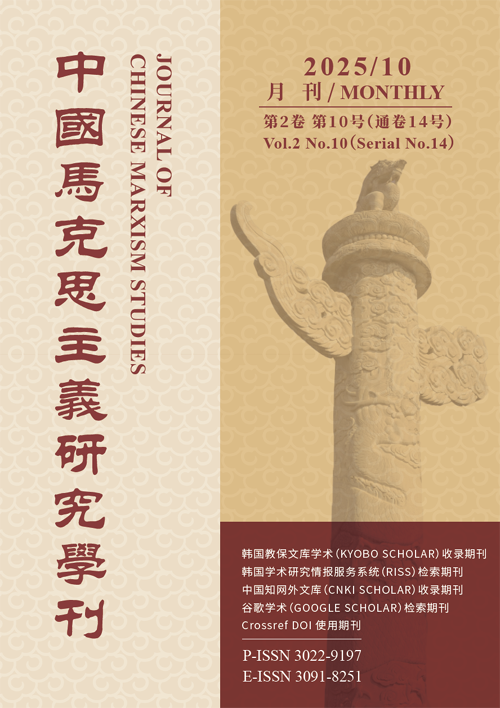- 영문명
- A Study on the Practical Dilemmas and Approaches of Whole-process People’s Democracy under the Horizon of Grassroots Governance Modernization
- 발행기관
- YIXIN 출판사
- 저자명
- Tang Xiaomin
- 간행물 정보
- 『Journal of Chinese Marxism studies』Vol.2 No.10, 89~96쪽, 전체 8쪽
- 주제분류
- 사회과학 > 교육학
- 파일형태
- 발행일자
- 2025.10.31
4,000원
구매일시로부터 72시간 이내에 다운로드 가능합니다.
이 학술논문 정보는 (주)교보문고와 각 발행기관 사이에 저작물 이용 계약이 체결된 것으로, 교보문고를 통해 제공되고 있습니다.

국문 초록
Whole-Process People’s Democracy constitutes a pivotal achievement in socialist democratic politics, forged through China’s long-standing social practice. As the cornerstone of national governance, grassroots governance provides a critical lens for examining Whole-Process People’s Democracy within the framework of grassroots governance capability modernization. Such an examination reveals an inherent unity between the modernization of grassroots governance and the advancement of Whole-Process People’s Democracy. Nevertheless, the ongoing drive toward grassroots governance modernization is still beset by the practical dilemma of “difficulty in implementing existing laws.” To attain the objective of Whole-Process People’s Democracy, it is imperative to fully leverage the leading role of the Communist Party of China, and on this foundation, integrate Whole-Process People’s Democracy into every stage and all dimensions of grassroots governance modernization. Concretely, efforts should be directed toward upholding and refining the grassroots governance system—featuring leadership by Party committees, responsibility assumption by governments, social collaboration, public participation, and legal safeguards—as well as the system of primary-level mass self-governance under the leadership of primary-level Party organizations. Simultaneously, it is essential to enhance the people’s participation in and oversight of grassroots governance, thereby fostering a grassroots social governance paradigm characterized by “co-construction, co-governance, and shared benefits.” Furthermore, advancing the in-depth integration of digital technology with the development of Whole-Process People’s Democracy will furnish robust technical support for the materialization of this democratic model.
영문 초록
全过程人民民主是在我国长期社会实践过程中发展起来的社会主义民主政治重要成果。国家治理的基础是基层治理,将全过程人民民主置于基层治理能力现代化视域下审视,可以发现,基层治理现代化与全过程人民民主建设具有内在统一性,而在当前基层治理现代化过程中,仍面临着“有法难依”的实践困境。为了达到全过程人民民主的目标,我们必须充分利用党的领导作用,并以此为基础将全过程人民民主贯穿基层治理现代化的全过程和各环节。坚持和完善党委领导、政府负责、社会协同、公众参与、法治保障的基层治理体制,坚持和完善基层党组织领导下的基层群众自治制度,加强人民群众对基层治理的参与和监督,形成“共建共治共享”的基层社会治理格局。通过推进数字技术与全过程人民民主建设深度融合,为实现全过程人民民主提供技术支撑。
목차
Ⅰ.引言
Ⅱ.全过程人民民主建设与基层治理现代化具有内在统一性
Ⅲ.当前基层治理能力现代化过程中的实践困境
Ⅳ.全过程人民民主赋能基层治理现代化的路径
Ⅴ.结语
参考文献
키워드
해당간행물 수록 논문
- Journal of Chinese Marxism studies Vol.2 No.10 Contents
- 马克思解放思想的政治经济学批判——以《论犹太人问题》为考察文本
- 马克思主义自我革命思想的生成渊源、理论结构与当代启示——以《共产党宣言》文本为中心的考察
- 马克思恩格斯“消灭家庭”思想的基本内涵及当代启示
- 数字资本主义时代技术应用异化现象审视
- 中央苏区时期青年群体的政治角色重塑机制及其历史经验探析
- 毛泽东诗词中伟大建党精神的意蕴及时代价值
- 新时代加强非公企业党建的主体动因、现实难题与优化思路
- 中国式现代化的认识论意蕴
- 新时代铸牢中华民族共同体意识的话语嬗变研究
- 基层治理现代化视域下全过程人民民主的实践困境与路径研究
- 交往实践重构与乡村文化现代性转型——基于马克思社会交往理论的分析
- 促进人民精神生活共同富裕的价值旨趣——基于物质文明与精神文明相协调视角
- 文化主体性构建的时代意蕴、内在根基和实践路径
- “第二个结合”与中国式现代化价值观的建构逻辑
- 论习近平文化思想与中华优秀传统文化的关系
- 新媒体赋能红色文化传播:价值意蕴、挑战剖析与策略分析
- 文艺精品赋能新时代高校思政育人实践研究
참고문헌
교보eBook 첫 방문을 환영 합니다!

신규가입 혜택 지급이 완료 되었습니다.
바로 사용 가능한 교보e캐시 1,000원 (유효기간 7일)
지금 바로 교보eBook의 다양한 콘텐츠를 이용해 보세요!



